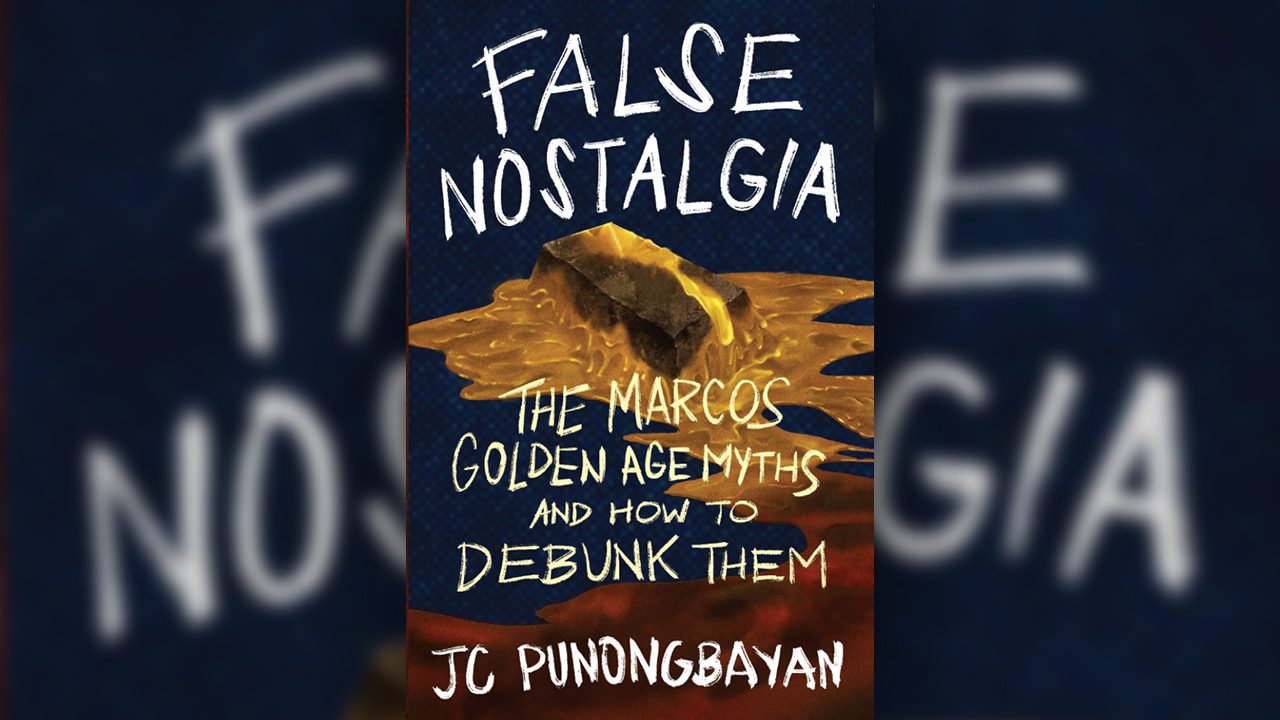SUMMARY
This is AI generated summarization, which may have errors. For context, always refer to the full article.

In the ephemeral world of social media, one where videos and vlogs regardless of the quality of their content go viral, and where our information landscape is so flooded that people cannot discern truth from fabrication, we struggle to agree on the basics of reality beyond what’s fed to us by algorithms. That long sentence is me trying to say, how can we agree on anything?
JC Punongbayan, brilliant young economist, columnist for Rappler, and someone I’ve had the pleasure of collaborating with before (there’s my full disclosure that I, as we all are, am biased in some way) has decided to bring the truth old-school: in print. After being confronted with the deluge of misinformation about the first Marcos presidency being a “Golden Age,” JC has literally written the book on it.
Before we proceed, a thought: isn’t it crazy that someone could write a book of over 300 pages just debunking falsehoods spread about the Marcoses?
The volume of lies abounds, and we know that it’s much easier to ramble on TikTok or YouTube and parrot made up stuff than it is to do the research. And when we say “do the research” here, that doesn’t mean more YouTube and stuff you’ve heard from elderly relatives. JC takes his passion for research here to give us a historical perspective through which we can understand and debunk the myths.
The book, entitled False Nostalgia: The Marcos ‘Golden Age’ Myths and How to Debunk Them, is structured as a series of essays, each one titled as a question to be answered. For example, “Nobody was poor?,” “‘Golden Age’ of Infrastructure?,” and “Marcos Plundered to Protect the Economy?” You’ll recognize these as various claims that, if you have been on any social media platform in the last two years, are all over the internet and pop up in online interactions.
JC takes each claim seriously. Even the most absurd are subjected to analysis, JC applying his academic rigor to come to an answer. He stands on both historical fact and economic analysis to debunk the myths. How effective that will be in changing minds, we do not know, but I am glad that he has chosen this approach, because it is truly necessary.
The act of publication, and the publication of the book through an academic publisher (Ateneo de Manila University Press) imbues even more credibility to the book. If we weren’t in such a bizarro world, then we could, metaphorically of course, slap this down at every possible argument and say that the myths are myths. Here’s the research. “Read ‘em and weep,” as it were.
But again, the book’s mere existence prompts conversation. What can a book accomplish? Once the book debunking myths has literally been written and published, what now? Who’ll actually read this book?
Who should read it? Everyone. There’s a lot of discussion about grade school and high school curricula being insufficient when it comes to history. Also, there’s historical erasure, Martial Law being skipped over, or even the intentional teaching of the myths. This book would serve us all as a reminder, at least when it comes to the false claims, that we need to study our history. Of course, to have a full sense of our history, everyone needs to study beyond this book, but it’s a great starting point.
However, this book won’t be the easiest read. And it isn’t…fun. It is an academic book. Suffice it to say that you need a certain level of education and reading comprehension to wrap your heads around everything in it. JC does a good job of explaining things in as laymanized a way as possible, but this isn’t something that everyone can pick up easily. In addition, it’s not really meant for a straight-through read, which is how I experienced the book. (Of course, I was reading the book for review, so I had to go through it end to end.) But I think the ideal use-case for the book is as something that readers can dip into. People have this on their shelves; they read some of the essays. Then they run into false claims online, and they pull out this book, and they are provided with content and analyses that help to educate them.
I don’t know how effective this will be in changing minds that are, at the moment, entrenched. But I am hopeful that this book being in circulation will help people not just as readers, but as citizens. I can also see this as an invaluable tool for both parents and teachers. Where some might have struggled to address false claims and myths that their kids might have come across online, now they have this important resource.
And honestly, I’m hoping that this is the first of many books that help us, as a society, set the historical record straight. This could be the opening to a conversation that starts getting us back to a shared reality, one where we agree on truths again. And the first step is debunking the myths. – Rappler.com
False Nostalgia: The Marcos ‘Golden Age’ Myths and How to Debunk Them will soon be available on the Lazada and Shopee stores of Ateneo Press.
Note: This article contains affiliate links. We earn a small commission every time you buy through these links.
Add a comment
How does this make you feel?
![[ANALYSIS] Undoing ‘false nostalgia’ about the Marcos years](https://www.rappler.com/tachyon/2023/02/TL-false-nostalgia.jpg?fit=449%2C449)
There are no comments yet. Add your comment to start the conversation.